October 6, 2016, published in BBC News
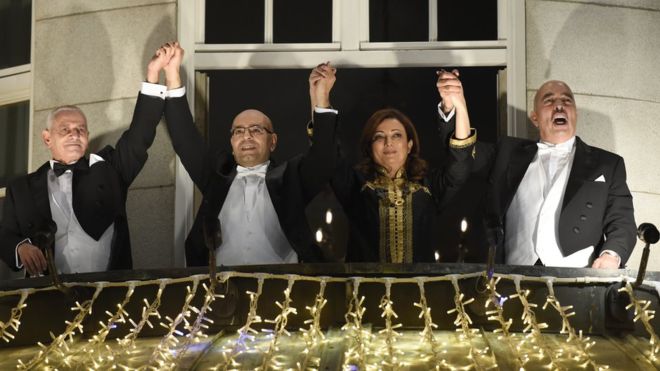
The Tunisian National Dialogue Quartet won the prize in 2015, beating more well-known candidates
The winner of the Nobel Peace Prize will be announced this Friday in the Norwegian capital, Oslo.
Predicting who will win is notoriously difficult, not least because of the secrecy surrounding the award.
Last year, the prize went to the Tunisian National Dialogue Quartet, a group lauded for helping their country’s transition to democracy.
The Nobel Committee defied expectations that German Chancellor Angela Merkel might win for her response to the European migrant crisis.
Nominees are officially kept secret for 50 years, but those eligible to nominate candidates – which include parliamentarians, university professors and former Nobel Peace Prize Laureates – often reveal who they have put up for the prize.
Of this year’s record 376 candidates, 228 are individuals and 148 are organisations.
Nominees reportedly up for the gong range from the Afghan Cycling Federation’s women’s team (representing the bicycle) to Donald Trump (for his “vigorous peace through strength ideology”).
Here are some of the candidates who have been touted as frontrunners for the prize:
Svetlana Gannushkina
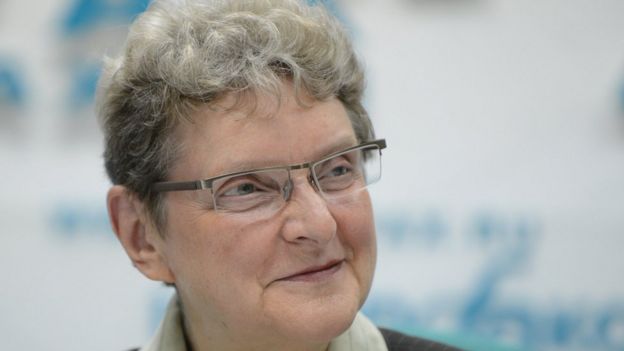 Image copyrightAFP
Image copyrightAFPProminent Russian human rights activist Svetlana Gannushkina’s Civic Assistance Committee provides legal help, aid and education to migrants and refugees.
Her organisation says it has helped more than 50,000 people since 1990.
Ms Gannushkina recently won the Right Livelihood Award, said to be the “alternative Nobel” – a prize also picked up by Syria’s White Helmets rescue group (profiled below).
Kristian Berg Harpviken, director of the Peace Research Institute Oslo, placed her at the top of his shortlist for the prize this year.
Given the record number of people displaced globally and the heated debate about refugee resettlement in the West, Ms Gannushkina’s advocacy played an important role, he said.
A prize for her, aside from recognising her tireless rights work, “would also draw attention to the problematic record of the current Russian leadership”, he added.
Civic Assistance was last year labelled a “foreign agent” by the Russian government and experts say that giving Ms Gannushkina the prize could lead to backlash from Moscow.
Daring to choose her, or the independent Russian newspaper Novaya Gazeta (which was deemed a frontrunner last year by some) would “really underline the independence of the committee,” Norwegian historian and peace prize expert Asle Sveen told the BBC.
Negotiators of the Iranian nuclear deal
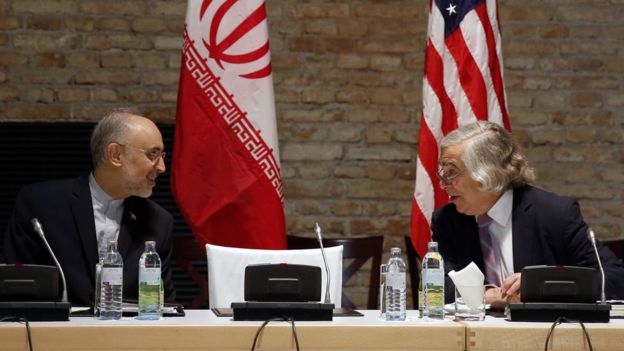 Image copyrightAFP
Image copyrightAFPThe diplomats responsible for the July 2015 deal – most prominently US Secretary of State John Kerry and his Iranian and EU counterparts Mohammad Javad Zarif and Federica Mogherini – had been tipped by some observers for the prize last year.
This year, given steady progress on the deal, including international sanctions on Iran being lifted in January to reward compliance, the Nobel Committee might decide to acknowledge its architects for their contribution to world peace in a turbulent time.
But Iranian and American involvement in Syria’s continuing civil war could make a peace prize win for their foreign ministers a tricky proposition.
Instead, Mr Sveen and Mr Harpviken both believe US Energy Secretary Ernest Moniz and Atomic Energy Organization of Iran head Ali Akbar Salehi could make better candidates.
The pair, whom share ties with the Massachusetts Institute of Technology (MIT), negotiated technical details of the agreement.
Their work together represents “a fine example of science diplomacy – the activation of scholarly competence to build bridges between people and nations,” Mr Harpviken says.
But an award to them would not be free of controversy, with Israel and US Republicans, who opposed the nuclear deal, likely to lead criticism.
Colombia’s peace accord
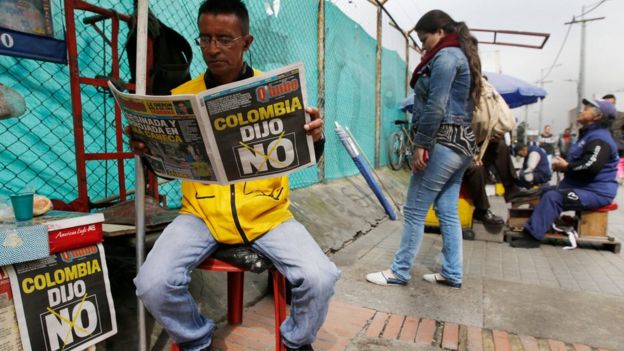 Image copyrightAP
Image copyrightAPThe end of a devastating 52-year war in Colombia through a negotiated accord is the kind of effort that many believed the Nobel Committee would not be able to ignore.
It has a long history of acknowledging peace processes in places like Northern Ireland, Israel/Palestine and Vietnam.
But the prospect of the award going to Colombian President Juan Manuel Santos and Farc rebel leader Rodrigo Londono (known as Timochenko) was dealt a significant blow on Sunday, when voters rejected the agreement in a shock referendum result.
It is now seen as highly unlikely. Still, the committee may have made their decision before the referendum and could still go ahead with it “to encourage
The last peace prize given to the Latin American region was in 1992 and there could also be a geographical consideration, he added.
Syria’s ‘White Helmets’
The Syria Civil Defence, known for their characteristic white helmets, rush to bomb sites in war-torn Syria and pull out victims from rubble, often facing the great risk of follow-up air strikes.
The nearly 3,000 strong group, made up of students, teachers, farmers and other volunteers, is credited with saving tens of thousands of people. They work under the motto that “to save a life is to save all of humanity” and, despite operating largely in rebel-held areas, insist on their neutrality.
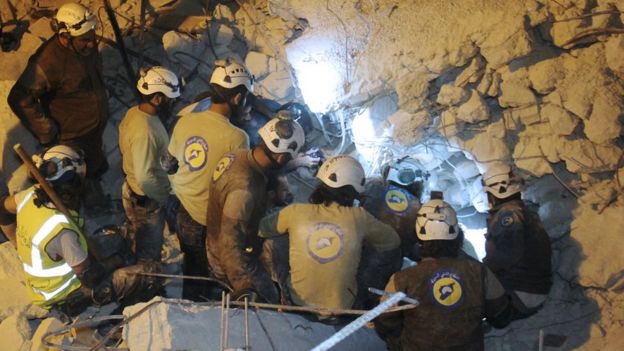 Image copyrightAFP
Image copyrightAFPThe subject of a recent Netflix documentary, the White Helmets are increasingly in the global public eye, though the Syrian government has accused them of being politically partisan.
A campaign backing them for the Nobel has received more than 204,000 signatures. But it is unclear who would represent them at the ceremony and an award for the White Helmets could reignite longstanding debates about how the committee defines peace promotion, given it would be recognising humanitarian efforts.
Nonetheless, a win for them would “draw attention to the remarkable – yet rarely celebrated – resilient forces of societies hit by armed conflict”, Mr Harpviken says.
96 prizes awarded 1901-2015
- 16 women have been awarded the prize
- 62 average age of laureates when they were awarded the prize
- 17 the age of Malala Yousafzai when she won the prize in 2014
- 3 laureates were under arrest at the time of the award: Carl von Ossietzky, Aung San Suu Kyi & Liu Xiaobo
Other notable candidates include:
- Edward Snowden, the now Russia-based former US National Security Agency analyst who revealed the extent of government surveillance. Mr Snowden is due to receive the Ossietsky freedom of speech award in Norway in November but is seeking guarantees he will not be extradited to the US.
- DR Congo gynaecologist Denis Mukwege, who has personally treatedthousands of victims of rape and sexual violence at the Panzi Hospital in Bakuvu, eastern DR Congo. Mr Mukwege has been previously nominated for the Nobel and won the European Parliament’s prestigious Sakharov prize in 2014.
- Greek islanders on the frontline of the migrant crisis have also been nominated for their compassion and care for Syrian refugees. Several representatives have reportedly been put forward to symbolise the group, including 85-year-old Emilia Kamvisi from Lesbos who was pictured bottle-feeding a Syrian baby, fisherman Stratis Valiamos who personally rescued many refugees from drowning, and Hollywood actor Susan Sarandon, who spent time volunteering on the islands.
How the prize is decided
- Eligible nominators from around the world can put forward candidates up to 1 February of the award year, while Nobel Committee members have more time.
- All nominations are reviewed by the committee – whose five members are chosen by the Norwegian parliament – before a shortlist of 20-30 candidates are selected.
- A group of Norwegian and international advisers write individual reports on the shortlisted candidates. Using these and further reports, the committee narrows the selection down to a handful.
- A decision is reached in the last meeting of the committee, usually in late September or early October, before the prize is announced.
- If a unanimous decision can’t be reached, a simple majority vote is used.
- After the announcement is made, the award ceremony takes place on 10 December, the date of Alfred Nobel’s death.
Read the original article here.

Leave A Comment
You must be logged in to post a comment.